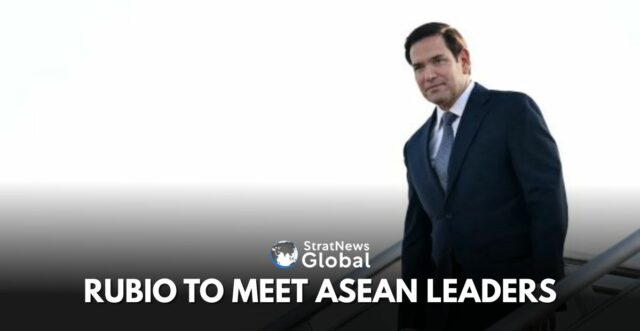U.S. Secretary of State Marco Rubio is set to meet Southeast Asian leaders on Thursday during his first official trip to Asia. His visit aims to reaffirm Washington’s commitment to the region, even as President Donald Trump’s expanding tariff campaign increasingly targets the region.
Washington’s top diplomat will meet foreign ministers of the 10-member Association of Southeast Asian Nations gathered in Kuala Lumpur, and also hold talks with Russian Foreign Minister Sergei Lavrov who is in the Malaysian capital, according to the U.S. State Department.
Rubio’s trip is part of an effort to renew U.S. focus on the Indo-Pacific and look beyond the conflicts in the Middle East and Europe that have consumed much of the Trump administration’s attention, with Rubio balancing dual responsibilities as secretary of state and national security adviser.
Trump’s Tariff Strategy
However, Trump’s global tariff strategy is likely to cast a shadow over the trip, after the president announced steep tariffs to take effect on August 1 on six ASEAN members, including Malaysia, as well as on close Northeast Asian allies Japan and South Korea.
Rubio will nevertheless seek to firm up U.S. relationships with partners and allies, who have been unnerved by the tariffs, and is likely to press the case that the United States remains a better partner than China, Washington’s main strategic rival, experts said.
“This is significant, and it’s an effort to try to counter that Chinese diplomatic and economic offensive,” said Victor Cha, president of the geopolitics and foreign policy department at Washington’s Center for Strategic and International Studies.
Rubio will also meet with Lavrov later on Thursday, according to the U.S. State Department schedule. It would be the second in-person meeting between Rubio and Lavrov, and comes at a time when Trump has grown increasingly frustrated with Russian President Vladimir Putin as the war in Ukraine drags on.
China’s Foreign Minister Wang Yi is also expected to join talks from Thursday, but it was unclear if Rubio would meet with him.
‘Better Late Than Never’
A senior U.S. State Department official told reporters on Monday that among Rubio’s priorities on the trip was reaffirming Washington’s commitment to the region, not just for its sake but because it promotes American prosperity and security.
“It’s kind of late, because we’re seven months into the administration,” Cha said of Rubio’s trip. “Usually, these happen much sooner. But then again, it is extraordinary circumstances. But I guess better late than never.”
Security cooperation is a top priority, including the strategic South China Sea, and combating transnational crime, narcotics, scam centers, and trafficking in persons, said the State Department official, speaking on the condition of anonymity.
As well as their unease about Trump’s tariff policies, many in the Indo-Pacific have doubts about the willingness of his “America First” administration to fully engage diplomatically and economically with the region.
Trump said this week he would impose a 25% tariff on Japan and South Korea and also took aim at ASEAN nations, announcing a 25% levy on Malaysia, 32% on Indonesia, 36% on Cambodia and Thailand, and 40% on Laos and Myanmar.
Trump has also upset another key Indo-Pacific ally, Australia, which said on Wednesday it was “urgently seeking more detail” on his threat to raise tariffs to 200% on pharmaceutical imports.
‘Concern Over Trade Tensions’
According to a draft joint communique, ASEAN foreign ministers will express “concern over rising global trade tensions and growing uncertainties in the international economic landscape, particularly the unilateral actions relating to tariffs.”
The draft, dated Monday, before the latest U.S. tariff rates were announced, did not mention the United States and used language similar to an ASEAN leaders’ statement in May. Both said tariffs were “counterproductive and risk exacerbating global economic fragmentation.”
The State Department official said Rubio would be prepared to discuss trade and reiterate that the need to rebalance U.S. trade relationships is significant.
The export-reliant ASEAN is collectively the world’s fifth-biggest economy, with some members beneficiaries of supply chain realignments from China. Only Vietnam has secured a deal with Trump, which lowers the levy to 20% from 46% initially.
(With inputs from Reuters)





